Ideology of Pakistan & its Political Background
- What is Ideology
- Importance of Ideology
- Some Basic Concepts, i.e. Sovereignty and its types, Civilization, Culture.
- History of Muslims in Sub-continent
- Foundation of ideology of Pakistan
- Ideological clash between Muslims and Hindus/non-Muslims
2. Two-Nation Theory
- Islamic ideology is the philosophy underlying the Two Nations theory
- Pakistan is a state founded on ideological basis and not on the territorial grounds
- Political differences
- Social difference
- Economic differences
3. Sir Syed Ahmad Khan, Iqbal, Jinnah and Ideology of Pakistan
- Relation among Sir Syed, Jinnah, Iqbal and Ideology of Pakistan
- The role of Ali Garh Movement for the uplift of Muslim
- Analyze socio-political and economic system of West and Islam with reference to Iqbal and Jinnah’s Thoughts
- Formation of Pakistan, their struggle for Muslims political and social rights.
- Iqbal, Jinnah and the Concept of Nationalism
- Jinnah’s Vision of Pakistan
- Jinnah Concept of welfare state
4. Role of Ulama and Muslims Institutions for the protection of Muslim
- Hindu different movements and its role against the minorities especially against Muslims i.e. Aarya Samajh, Brahmo Samajh, Hindu Mahasbha etc.
- Role of Muslims institutions and Ulama in supporting ideology of Islam and Pakistan
- Role of Deoband, Nadva-tul Uluma, Anjuman Himayat e Islam and Sindh Madrasah-tul Islam
- How they support the cause of Pakistan
- Formation of political parties i.e. JUH, INC and AIML and their approaches towards Nationalism.
- Mulana Abul Kalam Azad, Ashraf Ali Thanvi, Mulana Hussain Ahmad Madani and their Ideological approaches
5. 1906 New Political Party All India Muslim League (AIML)
- Why need of a political party for Muslims?
- Role of AIML, and its contribution in sub-continent politics for the Muslims
- How AIML protected Muslims political, social and economic rights in sub-continent
- Its role in the formation of Pakistan
- Its strong advocacy for the establishment of a separate Muslim state.
- To Discuss its need, reason and the reactions of India National Congress against AIML
6. Nehru Report 1928, Jinnah’s Fourteen Points 1929 & Iqbal Address 1930
- Reason and Need of Nehru Report 1928
- Why the report proposed new dominion status constitution for India
- Comparative study of Nehru report and Jinnah Fourteen Points
- To discuss and analyze the need and reason of Jinnah Fourteen Points
- How Jinnah Fourteen Points safeguarded the political rights of Muslims
- To discuss Jinnah's aim to get more rights for Muslims
- The need of 1930 Allahabad Address
- Key Points of Allahabad Address 1930
7. Initial Problem of Pakistan and Important Events
- Choice of Capital and Establishment of Government
- Unfair Boundary Distribution
- Division of Military Assets
- Division of financial assets
- Economic Problems
- Issue of national language
- Electricity Problem
- Kashmir Dispute
- Canal Water Dispute
- Constitutional Problem
- Khatm-e-Nabuwwat amendment
8. Aims and Objectives of Pakistan and Objective Resolution
- Salient features of Objectives Resolution
- Why it was adopted by the Constituent Assembly of Pakistan on 12 March 1949
- How Objectives Resolution discuss the ideology of Pakistan and democratic faith of Islam
- Speech of Liaqat Ali Khan to Constituent Assembly of Pakistan on March 12, 1949.
- Criticism on Objective Resolution by minorities …Why?
- Aims and objective of creation of Pakistan
- Importance of Civilization and Muslims has to protect their culture and civilization as Iqbal mentioned in his speech. Why?
9. Struggle for the Islamization in Pakistan and 22 Points of Ulama
- Why was the need of Uluma summit?
- The role Ulamas for Islamization to implement Pakistan and Islamic Ideology
- What was that 22 principles (formulated by the said summit)
- How it will be followed by the constitution for Islamic State
10. Salient Feature of 1973 Constitution
- A Written Constitution
- Flexibility
- Republican Form of Government
- Federal Form of Government
- Parliamentary Form of Government
- Bicameral Legislature
- Fundamental Rights
- Pakistan to be a Welfare State
- Islamic Provision of 1973 Constitutions
11. Administrative Structure and Politics of Pakistan
- Executive
- Legislation
- Judiciary
- Status of President
- Provincial government
- Governors
- FATA and PATA.
- Major political parties and its role in Pakistan
12. Challenges and Problems for Pakistan in Present & Future
- Hunger
- Poverty
- Illiteracy
- Poor health condition
- Unemployment
- Corruption
- Inefficient leadership
- Future challenges for Pakistan i.e. Pak-Indo relations, CPEC, counter terrorism and other Social, economic and political challenges for the state

 ALLAMA IQBAL QAID-E-AAZAM AUR NAZARIYA-E-PAKISTAN
by
ALLAMA IQBAL QAID-E-AAZAM AUR NAZARIYA-E-PAKISTAN
by
 Tehreek e Azadi e Hind aur Musalman
by
Tehreek e Azadi e Hind aur Musalman
by
